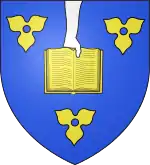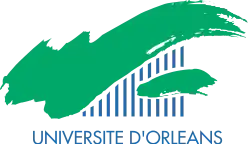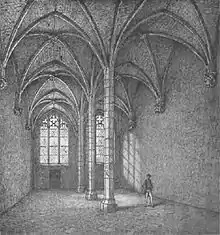University of Orléans
The University of Orléans (French: Université d'Orléans) is a French university, in the Academy of Orléans and Tours. As of July 2015 it is a member of the regional university association Leonardo da Vinci consolidated University.[1]
 | |
| Type | Public |
|---|---|
| Established | 1306 |
| President | Ary Bruand |
| Location | , France |
| Campus | Orléans-la-Source |
| Website | www.univ-orleans.fr |
 | |
History

In 1230, when for a time the doctors of the University of Paris were scattered, a number of the teachers and disciples took refuge in Orléans; when pope Boniface VIII, in 1298, promulgated the sixth book of the Decretals, he appointed the doctors of Bologna and the doctors of Orléans to comment upon it.
St. Yves (1253–1303) studied civil law at Orléans, and Pope Clement V also studied there law and letters; by a Papal Bull published at Lyon, 27 January 1306, he endowed the Orléans institutes with the title and privileges of a University (it has been founded as one of the very earliest universities outside Italy in 1235, only two years after Cambridge, in France only Paris' Sorbonne was even older).
Twelve later popes granted the new university many privileges. In the 14th century it had as many as five thousand students from France, Germany, Lorraine, Burgundy, Champagne, Picardy, Normandy, Touraine, Guyenne and Scotland.
The current university was founded in 1960, after its medieval predecessor was closed down in 1793 and merged into the University of France in 1808.
Outstanding professors
- Robert Joseph Pothier (1699–1722), lawyer.
- Daniel Jousse (1704–1781), lawyer.
Notable alumni
- John Calvin (1509–1564), influential French theologian, pastor and reformer during the Protestant Reformation
- Molière (1622–1673), French playwright and actor, considered to be one of the greatest masters of comedy in Western literature
- Pierre de Fermat (c. 1601 – 1665), best known for his Fermat's principle for light propagation and his Fermat's Last Theorem in number theory
- St Ivo of Kermartin (died 1303), patron of lawyers
- Étienne de Mornay, counsellor of Philippe IV le Bel
- Johannes Reuchlin (1455–1522)
- Guillaume Budé (1468–1540)
- Francis Bothwell, Procurator of the Scottish Nation at Orléans during 1513–1514, later a member of the Parliament of Scotland and a judge
- Étienne de La Boétie (1530–1563)
- Thomas Brooke alias Cobham (1533–1578)
- Agrippa d'Aubigné (1552–1630)
- Théophraste Renaudot (1586–1653)
- Charles Perrault (1628–1703)
- Jean de La Bruyère (1645–1696)
- Michel Jébrak